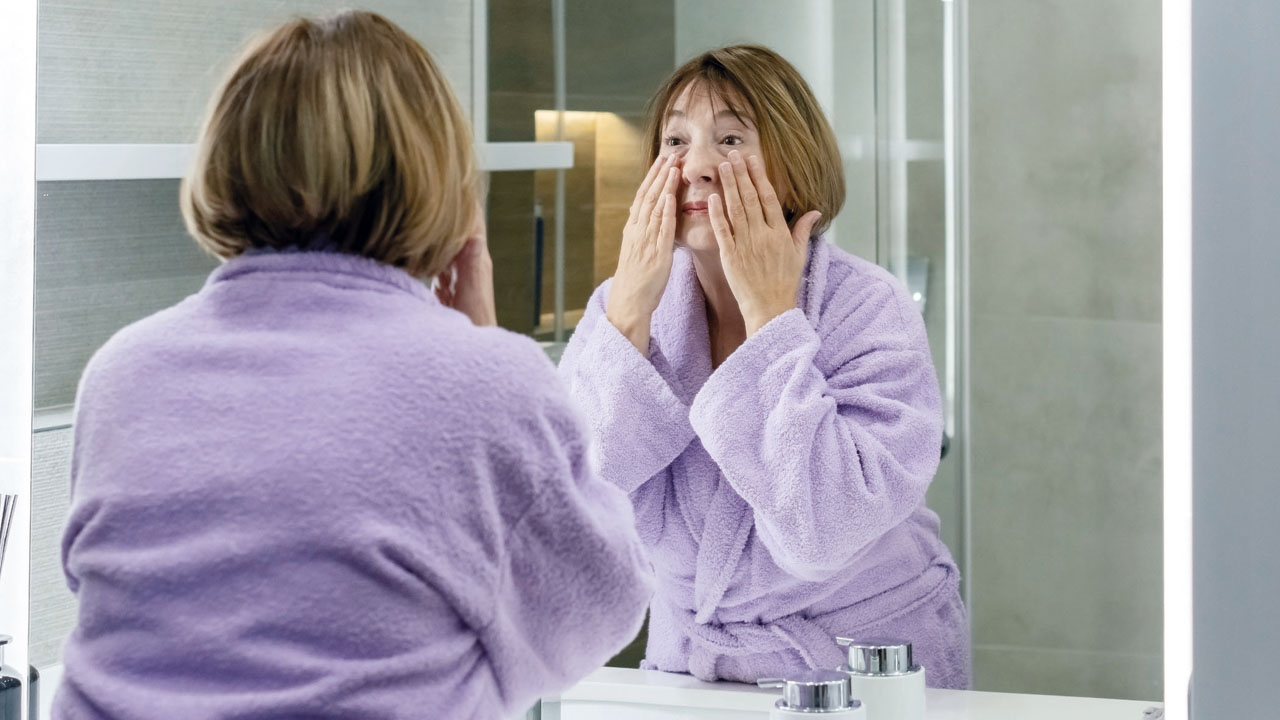In Clinical
Follow this topic
Bookmark
Record learning outcomes
Many women are unaware how menopause can affect their skin, according to new research from Japanese skincare brand Hada Labo Tokyo.
In the research 42 per cent of women claimed that changes to their skin had been the most distressing menopausal symptom they experienced. And the majority of women felt unprepared for this – 69 per cent claimed that no medical professional had warned them about the impact of this stage of life on their skin.
These results correlate with similar conclusions from a British Skin Foundation survey. Nearly a quarter (22 per cent) of respondents felt they were uninformed about the effects of the menopause before going through it.
Hormonal effects
As women enter the perimenopause – usually between 45 and 55 years of age – the reduction in the production of progesterone and oestrogen starts to take its toll on the skin.
“It is the hormone oestrogen that helps to maintain skin’s plumpness and moisture, so when we lose it, our skin can dry out and look thinner,” says women’s health specialist Dr Catherine Hood.
“The lack of oestrogen can also lead to lower collagen levels, produced less as the body ages. It is a form of protein, essential to help skin remain firm, rather than sagging.
“It is important that women are warned of the potential skin changes that could occur as they transition through the menopause as these changes can cause a huge drop in a woman’s confidence. It is good to know what may happen ahead of time so relevant steps can be taken to try and counteract the impact of the menopause.”
Hyaluronic acid
Dietary habits, ultraviolet light and daily skincare regimens all have an important role to play in helping to keep the skin as plump and problem-free as possible during the menopause.
“The key ingredient for keeping skin hydrated is hyaluronic acid. As people age, the body’s levels of hyaluronic acid fall,” says aesthetics skincare specialist Dr Noman Mohamed. “If you consider that one-third of hyaluronic acid is found in the skin, with hyaluronic acid levels halving by the age of 50 years, then this is naturally going to have a significant impact on hydration levels.”
Hyaluronic acid is a naturally occurring glycosaminoglycan found throughout the body’s connective tissue. A study published in the Journal of Clinical and Aesthetic Dermatology showed that it had a significant benefit in decreasing the depth of wrinkles (up to 40 per cent) and increasing skin hydration (up to 96 per cent). Skin firmness and elasticity were significantly enhanced (up to 55 per cent) at the end of eight weeks. Hyaluronic acid can also help to manage eczema.
Sufficient sun protection
Major awareness campaigns about the effects of sun damage – including the crucial link with skin ageing – are seemingly largely ignored as evidence suggests millions of people are still not sufficiently protecting themselves from the sun’s dangers.
The Hada Labo Tokyo research revealed that only 56 per cent of people use sun cream or a product containing a SPF daily.
Furthermore, 70 per cent of women were unaware of the British Association of Dermatologists’ recent recommendation that sunscreen should be used for six months of the year, due to record levels of skin cancer (one in five people will now get skin cancer in their lifetime). Increasingly dermatologists are also recommending using sun protection year-round to reduce premature ageing.
Older women, who are at the highest risk of skin cancer, are actually the least likely to protect their skin, the Hada Labo Tokyo research shows. Yet for menopausal women, protecting skin from the sun should be a critical part of their skincare routine. Not only does good protection help to reduce the risk of getting skin cancer, but it can also help to fade age spots and prevent new spots from forming.
Pharmacy support
One of the key messages from last year’s World Menopause Day was that more support for the menopause could be delivered through community pharmacies.
“Pharmacists are already a key source of advice for women experiencing perimenopause and menopause,” says Dr Hood. “This extends to health and wellbeing symptoms associated with both phases. With skin changes being a symptom of the menopause, they could be well placed to offer advice or signpost women to further support [especially as] these skin changes can also be catalysts for making current conditions worse.
“Perimenopause and menopause mark a huge hormonal shift for women and these hormonal changes that occur during menopause can really impact the skin’s hydration levels. Pharmacists could offer advice on how to care for and hydrate the skin. Key anti-ageing ingredients – like retinol and hyaluronic acid – are essential inclusions to support collagen production and strengthen the epidermal barrier.”
- Both Dr Hood and Dr Mohamed are members of the Hada Labo Tokyo skincare panel.

